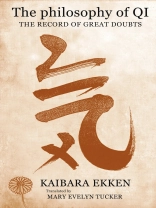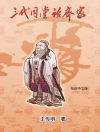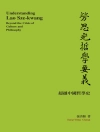The Record of Great Doubts emphasizes the role of qi in achieving a life of engagement with other humans, with the larger society, and with nature as a whole. Rather than encourage transcendental escapism or quietism, Ekken articulates a philosophy of material force as a basis of living a life of commitment to the world. In this spirit, moral cultivation is not an isolated or a self-centered preoccupation, but an activity that occurs within the dynamic forces of nature and amid the rigorous demands of society. In this context, a vitalism of qi is an emergent force, not only providing the philosophical grounding for this vibrant interaction but also giving a basis for an investigation of the natural world that plumbs the principle within things. Ekken thus aimed to articulate a creative and dynamic milieu for moral education, political harmony, social coherence, and agricultural sustainability.
The Record of Great Doubts embodies Ekken’s profound commitment to Confucian ideas and practices as a method for establishing an integrative ethical vision, one he hoped would guide Japan through a new period of peace and stability. A major philosophical treatise in the Japanese Neo-Confucian tradition, The Record of Great Doubts illuminates a crucial chapter in East Asian intellectual history.
Tabella dei contenuti
Acknowledgments
Introduction
Taigiroku: The Record of Great Doubts
Preface
Part I
On the Transmission of Confucian Thought (1-11)
On Human Nature (12-14)
On Bias, Discernment, and Selection (15-23)
On Learning from What Is Close at Hand (24-28)
The Indivisibility of the Nature of Heaven and Earth and One’s Physical Nature (29)
Acknowledging Differences with the Song Confucians (30-42)
Part II
Partiality in the Learning of the Song Confucians (43-46)
Reverence Within and Righteousness Without (47-50)
Influences from Buddhism and Daoism (51-60)
A Discussion of the Metaphysical and the Physical (61)
The Supreme Ultimate (62-66)
The Way and Concrete Things (67-68)
Returning the World to Humaneness (69)
Reverence and Sincerity (70-71)
Reverence as the Master of the Mind (72-80)
The Inseparability of Principle and Material Force (81)
Glossary
Bibliography
Circa l’autore
Mary Evelyn Tucker (Ph D, Jananese Confucianism, Columbia) is Senior Lecturer and Research Scholar at the Yale University School of Forestry and Environmental Studies, Department of Religious Studies, and the Divinity School. She directs the Forum on Religion and Ecology at Yale with her husband, John Grim. She is also Research Associate at the Reischauer Institute of Japanese Studies at Harvard. She is the author of several books, including Worldly Wonder: Religions Enter Their Ecological Phase (Open Court, 2003) and The Philosophy of Qi (Columbia, 2007). She is the editor of several of Thomas Berry’s books, including The Sacred Universe (Columbia, 2009). She is the coeditor (with Grim) of Ecology and Religion (Island, 2014) and the World Religions and Ecology series (Harvard) and (with Grim and Willis Jenkins) of the Routledge Handbook on Religion and Ecology (2016). She and Grim are the managing trustees of the Thomas Berry Foundation.












